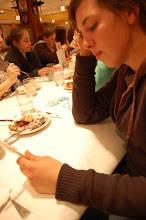Studs Terkel, Chicago native and famous oral historian passed away on October 31 of last year. Four days later his book “P.S. Further Thoughts From a Lifetime of Listening,” was published. Author of sixteen other books and a disc jockey for 45 years, Terkel made a living out of listening to people tell their stories, and telling those stories to the world.
It is hard to know where to start when reading Terkel’s large body of work. Although “P.S.” is his last book, it is a good first read for those new to Terkel.
The book is a compilation of previously published essays and works that Terkel claims in his preface were, “scattered, torn sheets of wrinkled paper under the desk, behind the bookcases, beneath the couch, tossed in boxes, everywhere.”
Because of the “scattered” nature of this book’s creation, it has an eclectic nature that reflects Terkel and his interests well. One of the essays “Dreamland,” is autobiographical. Terkel writes about his youth and his brother’s mishaps with girls he brought home from Dreamland, a dance hall where black jazz bands played. This essay gives the reader a good picture of Terkel’s boyhood in the 1920’s, and reminds one that life isn’t pristine in any decade.
The greatest essay in the book is Terkel’s interview with author James Baldwin. In the essay the reader can see how skilled Terkel was as an interviewer by the questions he asked Baldwin.
The interview took place in 1961, and Baldwin has just published his book “Nobody Knows My Name.” In the interview, Baldwin reflects on the pain he suffered as an African American in the United States by not having an identity.
He said this identity must be discovered by both blacks and whites, and commented that, “the American Negro is the key figure in this country. And if we don’t face him, we will never face anything.”
This interview is intriguing because it is written at the heart of the civil rights movement, and it is on a subject that was important to Terkel, who also wrote an excellent book called “Race” where he interviewed white and black Americans about their thoughts, feelings, and experiences with race.
When one reads the Baldwin interview, and also the book “Race,” it is easy to initially feel as though the problems of race are solved, until the reader sees him or herself reflected in one of the interviews. And that is the point, by talking to everyday people, Terkel gives Americans a glimpse into their own hearts, and holds up a mirror to their inner personalities.
Terkel, who described himself as an agnostic in an interview on National Public Radio, came to different conclusions than the average evangelical Christian. However, despite his differences in worldview, Terkel has given America, and the world, a piece of its story through his interviews. Any reader desiring to better understand race and the American people should give Terkel’s books a try. They are worth a listen.
12 years ago
